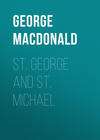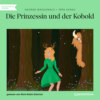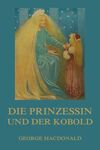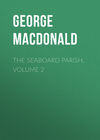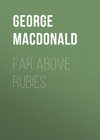Buch lesen: «St. George and St. Michael», Seite 27
CHAPTER XLVI
GIFTS OF HEALING
Soon after the king's departure, the marquis received from him a letter containing another addressed 'To our Attorney or Solicitor-General for the time being,' in which he commanded the preparation of a bill for his majesty's signature, creating the marquis of Worcester duke of Somerset. The enclosing letter required, however, that it should—'be kept private, until I shall esteem the time convenient.' In the next year we have causes enough for the fact that the king's pleasure never reached any attorney or solicitor-general for the time being.
About a month after the battle of Naseby, and while yet the king was going and coming as regards Raglan, the wounded Rowland, long before he was fit to be moved from the farm-house where his servant had found him shelter, was brought home to the castle. Shafto, faithful as hare-brained, had come upon him almost accidentally, after long search, and just in time to save his life. Mistress Watson received him with tears, and had him carried to the same turret-chamber whence Richard had escaped, in order that she might be nigh him. The poor fellow was but a shadow of his former self, and looked more likely to vanish than to die in the ordinary way. Hence he required constant attention—which was so far from lacking that the danger, both physical and spiritual, seemed rather to lie in over-service. Hitherto, of the family, it had been the marquis chiefly that spoiled him; but now that he was so sorely wounded for the king, and lay at death's door, all the ladies of the castle were admiring, pitiful, tender, ministrant, paying him such attentions as nobody could be trusted to bear uninjured except a doll or a baby. One might have been tempted to say that they sought his physical welfare at the risk of his moral ruin. But there is that in sickness which leads men back to a kind of babyhood, and while it lasts there is comparatively little danger. It is with returning health that the peril comes. Then self and self-fancied worth awake, and find themselves again, and the risk is then great indeed that all the ministrations of love be taken for homage at the altar of importance. How often has not a mistress found that after nursing a servant through an illness, perhaps an old servant even, she has had to part with her for unendurable arrogance and insubordination? But present sickness is a wonderful antidote to vanity, and nourisher of the gentle primeval simplicities of human nature. So long as a man feels himself a poor creature, not only physically unable, but without the spirit to desire to act, kindness will move gratitude, and not vanity. In Rowland's case happily it lasted until something better was able to get up its head a little. But no one can predict what the first result of suffering will be, not knowing what seeds lie nearest the surface. Rowland's self-satisfaction had been a hard pan beneath which lay thousands of germinal possibilities invaluable; and now the result of its tearing up remained to be seen. If in such case Truth's never-ceasing pull at the heart begins to be felt, allowed, considered; if conscience begin, like a thing weary with very sleep, to rouse itself in motions of pain from the stiffness of its repose, then is there hope of the best.
He had lost much blood, having lain a long time, as I say, in the fallow-field before Shafto found him. Oft-recurring fever, extreme depression, and intermittent and doubtful progress life-wards followed. Through all the commotion of the king's visits, the coming and going, the clang of hoofs and clanking of armour, the heaving of hearts and clamour of tongues, he lay lapped in ignorance and ministration, hidden from the world and deaf to the gnarring of its wheels, prisoned in a twilight dungeon, to which Richard's sword had been the key. The world went grinding on and on, much the same, without him whom it had forgotten; but the over-world remembered him, and now and then looked in at a window: all dungeons have one window which no gaoler and no tyrant can build up.
The marquis went often to see him, full of pity for the gay youth thus brought low; but he would lie pale and listless, now and then turning his eyes, worn large with the wasting of his face, upon him, but looking as if he only half heard him. His master grew sad about him. The next time his majesty came, he asked him if he remembered the youth, telling him how he had lain wounded ever since the battle at Naseby. The king remembered him well enough, but had never missed him. The marquis then told him how anxious he was about him, for that nothing woke him from the weary heartlessness into which he had fallen.
'I will pay him a visit,' said the king.
'Sir, it is what I would have requested, had I not feared to pain your majesty,' returned the marquis.
'I will go at once,' said the king.
When Rowland saw him his face flushed, the tears rose in his eyes, he kissed the hand the king held out to him, and said feebly:—
'Pardon, sire: if I had rode better, the battle might have been yours. I reached not the prince.'
'It is the will of God,' said the king, remembering for the first time that he had sent him to Rupert. 'Thou didst thy best, and man can do no more.'
'Nay, sire, but an' I had ridden honestly,' returned Rowland; '—I mean had my mare been honestly come by, then had I done your majesty's message.'
'How is that?' asked the king.
'Ha!' said the marquis; 'then it was Heywood met thee, and would have his own again? Told I not thee so? Ah, that mare, Rowland! that mare!'
But Rowland had to summon all his strength to keep from fainting, for the blood had fled again to his heart, and could not reply.
'Thou didst thy duty like a brave knight and true, I doubt not,' said the king, kindly wishful to comfort him; 'and that my word may be a true one,' he added, drawing his sword and laying it across the youth's chest, 'although I cannot tell thee to rise and walk, I tell thee, when thou dost arise, to rise up sir Rowland Scudamore.'
The blood rushed to sir Rowland's face, but fled again as fast.
'I deserve no such honour, sire,' he murmured.
But the marquis struck his hands together with pleasure, and cried,
'There, my boy! There is a king to serve! Sir Rowland Scudamore! There is for thee! And thy wife will be MY LADY! Think on that!'
Rowland did think on it, but bitterly. He summoned strength to thank his majesty, but failed to find anything courtier-like to add to the bare thanks. When his visitors left him, he sighed sorely and said to himself,
'Honour without desert! But for the roundhead's taunts, I might have run to Rupert and saved the day.'
The next morning the marquis went again to see him.
'How fares sir Rowland?' he said.
'My lord,' returned Scudamore, in beseeching tone, 'break not my heart with honour unmerited.'
'How! Darest thou, boy, set thy judgment against the king's?' cried the marquis. 'Sir Rowland thou art, and SIR ROWLAND will the archangel cry when he calls thee from thy last sleep.'
'To my endless disgrace,' added Scudamore.
'What! hast not done thy duty?'
'I tried, but I failed, my lord.'
'The best as often fail as the worst,' rejoined his lordship.
'I mean not merely that I failed of the end. That, alas! I did. But I mean that it was by my own fault that I failed,' said Rowland.
Then he told the marquis all the story of his encounter with Richard, ending with the words,
'And now, my lord, I care no more for life.'
'Stuff and nonsense!' exclaimed the marquis. 'Thinkest though the roundhead would have let thee run to Rupert? It was not to that end he spared thy life. Thy only chance was to fight him.'
'Does your lordship think so indeed?' asked Rowland, with a glimmer of eagerness.
'On my soul I do. Thou art weak-headed from thy sickness and weariness.'
'You comfort me, my lord—a little. But the stolen mare, my lord?—'
'Ah! there indeed I can say nothing. That was not well done, and evil came thereof. But comfort thyself that the evil is come and gone; and think not that such chances are left to determine great events. Naseby fight had been lost, spite of a hundred messages to Rupert. Not care for life, boy! Leave that to old men like me. Thou must care for it, for thou hast many years before thee.'
'But nothing to fill them with, my lord.'
'What meanest thou there, Rowland? The king's cause will yet prosper, and—'
'Pardon me, my lord; I spoke not of the king's majesty or his affairs. Hardly do I care even for them. It is a nameless weight, or rather emptiness, that oppresseth me. Wherefore is there such a world? I ask, and why are men born thereinto? Why should I live on and labour on therein? Is it not all vanity and vexation of spirit? I would the roundhead had but struck a little deeper, and reached my heart.'
'I admire at thee, Rowland. Truly my gout causeth me so great grief that I have much ado to keep my unruly member within bounds, but I never yet was aweary of my life, and scarce know what I should say to thee.'
A pause followed. The marquis did not think what a huge difference there is between having too much blood in the feet and too little in the brain.
'I pray, sir, can you tell me if mistress Dorothy knoweth it was before Heywood I fell?' said Rowland at length.
'I know not; but methinks had she known, I should sooner have heard the thing myself. Who indeed should tell her, for Shafto knew it not? And why should she conceal it?'
'I cannot tell, my lord: she is not like other ladies.'
'She is like all good ladies in this, that she speaketh the truth: why then not ask her?'
'I have had no opportunity, my lord. I have not seen her since I left to join the army.'
'Tut, tut!' said his lordship, and frowned a little. 'I thought not the damsel had been over nice. She might well have favoured a wounded knight with a visit.'
'She is not to blame. It is my own fault,' sighed Rowland.
The marquis looked at him for a moment pitifully, but made no answer, and presently took his leave.
He went straight to Dorothy, and expostulated with her. She answered him no farther or otherwise than was simply duteous, but went at once to see Scudamore.
Mistress Watson was in the room when she entered, but left it immediately: she had never been in spirit reconciled to Dorothy: their relation had in it too much of latent rebuke for her. So Dorothy found herself alone with her cousin.
He was but the ghost of the gay, self-satisfied, good-natured, jolly Rowland. Pale and thin, with drawn face and great eyes, he held out a wasted hand to Dorothy, and looked at her, not pitifully, but despairingly. He was one of those from whom take health and animal spirits, and they feel to themselves as if they had nothing. Nor have they in themselves anything. With those he could have borne what are called hardships fairly well; those gone, his soul sat aghast in an empty house.
'My poor cousin!' said Dorothy, touched with profound compassion at sight of his lost look. But he only gazed at her, and said nothing. She took the hand he did not offer, and held it kindly in hers. He burst into tears, and she gently laid it again on the coverlid.
'I know you despise me, Dorothy,' he sobbed, 'and you are right: I despise myself.'
'You have been a good soldier to the king, Rowland,' said Dorothy, 'and he has acknowledged it fitly.'
'I care nothing for king or kingdom, Dorothy. Nothing is worth caring for. Do not mistake me. I am not going to talk presumptuously. I love not thee now, Dorothy. I never did love thee, and thou dost right to despise me, for I am unworthy. I would I were dead. Even the king's majesty hath been no whit the better for me, but rather the worse; for another man,—one, I mean, who was not mounted on a stolen mare—would have performed his hest unhindered of foregone fault.'
'Thou didst not think thou wast doing wrong when thou stolest the mare,' said Dorothy, seeking to comfort him.
'How know'st thou that, Dorothy? There was a spot in my heart that felt ashamed all the time.'
'He that is sorry is already pardoned, I think, cousin. Then what thou hast done evil is gone and forgotten.'
'Nay, Dorothy. But if it were forgotten, yet would it BE. If I forgot it myself, yet would I not cease to be the man who had done it. And thou knowest, Dorothy, in how many things I have been false, so false that I counted myself honourable all the time. Tell me wherefore should I not kill myself, and rid the world of me; what withholdeth?'
'That thou art of consequence to him that made thee.'
'How can that be, when I know myself worthless? Will he be mistaken in me?'
'No, truly. But he may have regard to that thou shalt yet be. For surely he sent thee here to do some fitting work for him.'
More talk followed, but Dorothy did not seem to herself to find the right thing to say, and retired to the top of the Tower with a sense of failure, and oppressed with helpless compassion for the poor youth.
The doctors of divinity and of medicine differed concerning the cause of his sad condition. The doctor of medicine said it arose entirely from a check in the circulation of the animal spirits; the doctor of divinity thought, but did not say, only hinted, that it came of a troubled conscience, and that he would have been well long ago but for certain sins, known only to himself, that bore heavy upon his life. This gave the marquis a good ground of argument for confession, the weight of which argument was by the divine felt and acknowledged. But both doctors were right, and both were wrong. Could his health have been at once restored, a great reaction would have ensued, his interest in life would have reawaked, and most probably he would have become indifferent to that which now oppressed him; but on the slightest weariness or disappointment, the same overpowering sense of desolation would have returned, and indeed at times amidst the warmest glow of health and keenest consciousness of pleasure. On the other hand, if by any argument addressed to his moral or religious nature his mind could have been a little eased, his physical nature would most likely have at once responded in improvement; but he had no individual actions of such heavy guilt as the divine presumed to repent of, nor could any amount or degree of sorrow for the past have sufficed to restore him to peace and health. It was a poet of the time who wrote,
'The soul's dark cottage, battered and decayed,
Lets in new light, through chinks that time has made:'
sickness had done the same thing as time with Rowland, and he saw the misery of his hovel. The cure was a deeper and harder matter than Dr. Bayly yet understood, or than probably Rowland himself would for years attain to, while yet the least glimmer of its approach would be enough to initiate physical recovery.
CHAPTER XLVII
THE POET-PHYSICIAN
Time passed, but with little change in the condition of the patient.Winter began to draw on, and both doctors feared a more rapid decline.
Early in the month of November, Dorothy received a letter from Mr. Herbert, informing her that her cousin, Henry Vaughan, one of his late twin pupils, would, on his way from Oxford, be passing near Raglan, and that he had desired him to call upon her. Willing enough to see her relative, she thought little more of the matter, until at length the day was at hand, when she found herself looking for his arrival with some curiosity as to what sort of person he might prove of whom she had heard so often from his master.
When at length he was ushered into lady Glamorgan's parlour, where her mistress had desired her to receive him, both her ladyship and Dorothy were at once prejudiced in his favour. They saw a rather tall young man of five or six and twenty, with a small head, a clear grey eye, and a sober yet changeful countenance. His carriage was dignified yet graceful—self-restraint and no other was evident therein; a certain sadness brooded like a thin mist above his eyes, but his smile now and then broke out like the sun through a grey cloud. Dorothy did not know that he was just getting over the end of a love-story, or that he had a book of verses just printed, and had already begun to repent it.
After the usual greetings, and when Dorothy had heard the last news of Mr. Herbert,—for Mr. Vaughan had made several journeys of late between Brecknock and Oxford, taking Llangattock Rectory in his way, and could tell her much she did not know concerning her friend,—lady Glamorgan, who was not sorry to see her interested in a young man whose royalist predilections were plain and strong, proposed that Dorothy should take him over the castle.
She led him first to the top of the tower to show him the reservoir and the prospect; but there they fell into such a talk as revealed to Dorothy that here was a man who was her master in everything towards which, especially since her mother's death and her following troubles, she had most aspired, and a great hope arose in her heart for her cousin Scudamore. For in this talk it had come out that Mr. Vaughan had studied medicine, and was now on his way to settle for practice at Brecknock. As soon as Dorothy learned this, she entreated her cousin Vaughan to go and visit her cousin Scudamore. He consented, and Dorothy, scarcely allowing him to pause even under the admirable roof of the great hall as they passed through, led him straight to the turret-chamber, where the sick man was.
They found him sitting by the fire, folded in blankets, listless and sad.
When Dorothy had told him whom she had brought to see him, she would have left them, but Rowland turned on her such beseeching eyes, that she remained, by no means unwillingly, and seated herself to hear what this wonderful young physician would say.
'It is very irksome to be thus prisoned in your chamber, sir Rowland,' he said.
'No,' answered Scudamore, 'or yes: I care not.'
'Have you no books about you?' asked Mr. Vaughan, glancing round the room.
'Books!' repeated Scudamore, with a wan contemptuous smile.
'You do not then love books?'
'Wherefore should I love books? What can books do for me? I love nothing. I long only to die.'
'And go–?' suggested, rather than asked, Mr. Vaughan.
'I care not whither—anywhere away from here—if indeed I go anywhere. But I care not.'
'That is hardly what you mean, sir Rowland, I think. Will you allow me to interpret you? Have you not the notion that if you were hence you would leave behind you a certain troublesome attendant who is scarce worth his wages?'
Scudamore looked at him but did not reply; and Mr. Vaughan went on.
'I know well what aileth you, for I am myself but now recovering from a similar sickness, brought upon me by the haunting of the same evil one who torments you.'
'You think, then, that I am possessed?' said Rowland, with a faint smile and a glance at Dorothy.
'That verily thou art, and grievously tormented. Shall I tell thee who hath possessed thee?—for the demon hath a name that is known amongst men, though it frighteneth few, and draweth many, alas! His name is Self, and he is the shadow of thy own self. First he made thee love him, which was evil, and now he hath made thee hate him, which is evil also. But if he be cast out and never more enter into thy heart, but remain as a servant in thy hall, then wilt thou recover from this sickness, and be whole and sound, and shall find the varlet serviceable.'
'Art thou not an exorciser, then, Mr. Vaughan, as well as a discerner of spirits? I would thou couldst drive the said demon out of me, for truly I love him not.'
'Through all thy hate thou lovest him more than thou knowest. Thou seest him vile, but instead of casting him out, thou mournest over him with foolish tears. And yet thou dreamest that by dying thou wouldst be rid of him. No, it is back to thy childhood thou must go to be free.'
'That were a strange way to go, sir. I know it not. There seems to be a purpose in what you say, Mr. Vaughan, but you take me not with you. How can I rid me of myself, so long as I am Rowland Scudamore?'
'There is a way, sir Rowland—and but one way. Human words at least, however it may be with some high heavenly language, can never say the best things but by a kind of stumbling, wherein one contradiction keepeth another from falling. No man, as thou sayest, truly, can rid him of himself and live, for that involveth an impossibility. But he can rid himself of that haunting shadow of his own self, which he hath pampered and fed upon shadowy lies, until it is bloated and black with pride and folly. When that demon king of shades is once cast out, and the man's house is possessed of God instead, then first he findeth his true substantial self, which is the servant, nay, the child of God. To rid thee of thyself thou must offer it again to him that made it. Be thou empty that he may fill thee. I never understood this until these latter days. Let me impart to thee certain verses I found but yesterday, for they will tell thee better what I mean. Thou knowest the sacred volume of the blessed George Herbert?'
'I never heard of him or it,' said Scudamore.
'It is no matter as now: these verses are not of his. Prithee, hearken:
'I carry with, me, Lord, a foolish fool,
That still his cap upon my head would place.
I dare not slay him, he will not to school,
And still he shakes his bauble in my face.
'I seize him, Lord, and bring him to thy door;
Bound on thine altar-threshold him I lay.
He weepeth; did I heed, he would implore;
And still he cries ALACK and WELL-A-DAY!
'If thou wouldst take him in and make him wise,
I think he might be taught to serve thee well;
If not, slay him, nor heed his foolish cries,
He's but a fool that mocks and rings a bell.'
Something in the lines appeared to strike Scudamore.
'I thank you, sir,' he said. 'Might I put you to the trouble, I would request that you would write out the verses for me, that I may study their meaning at my leisure.'
Mr. Vaughan promised, and, after a little more conversation, took his leave.
Now, whether it was from anything he had said in particular, or that Scudamore had felt the general influence of the man, Dorothy could not tell, but from that visit she believed Rowland began to think more and to brood less. By and by he began to start questions of right and wrong, suppose cases, and ask Dorothy what she would do in such and such circumstances. With many cloudy relapses there was a suspicion of dawn, although a rainy one most likely, on his far horizon.
'Dost thou really believe, Dorothy,' he asked one day, 'that a man ever did love his enemy? Didst thou ever know one who did?'
'I cannot say I ever did,' returned Dorothy. 'I have however seen few that were enemies. But I am sure that had it not been possible, we should never have been commanded thereto.'
'The last time Dr. Bayly came to see me he read those words, and I thought within myself all the time of the only enemy I had, and tried to forgive him, but could not.'
'Had he then wronged thee so deeply?'
'I know not, indeed, what women call wronged—least of all what thou, who art not like other women, wouldst judge; but this thing seems to me strange—that when I look on thee, Dorothy, one moment it seems as if for thy sake I could forgive him anything—except that he slew me not outright, and the next that never can I forgive him even that wherein he never did me any wrong.'
'What! hatest thou then him that struck thee down in fair fight? Sure thou art of meaner soul than I judged thee. What man in battle-field hates his enemy, or thinks it less than enough to do his endeavour to slay him?'
'Know'st thou whom thou wouldst have me forgive? He who struck me down was thy friend, Richard Heywood.'
'Then he hath his mare again?' cried Dorothy, eagerly.
Rowland's face fell, and she knew that she had spoken heartlessly—knew also that, for all his protestations, Rowland yet cherished the love she had so plainly refused. But the same moment she knew something more.
For, by the side of Rowland, in her mind's eye, stood Henry Vaughan, as wise as Rowland was foolish, as accomplished and learned as Rowland was narrow and ignorant; but between them stood Richard, and she knew a something in her which was neither tenderness nor reverence, and yet included both. She rose in some confusion, and left the chamber.
This good came of it, that from that moment Scudamore was satisfied she loved Heywood, and, with much mortification, tried to accept his position. Slowly his health began to return, and slowly the deeper life that was at length to become his began to inform him.
Heartless and poverty-stricken as he had hitherto shown himself, the good in him was not so deeply buried under refuse as in many a better-seeming man. Sickness had awakened in him a sense of requirement—of need also, and loneliness, and dissatisfaction. He grew ashamed of himself and conscious of defilement. Something new began to rise above and condemn the old. There are who would say that the change was merely the mental condition resulting from and corresponding to physical weakness; that repentance, and the vision of the better which maketh shame, is but a mood, sickly as are the brain and nerves which generate it; but he who undergoes the experience believes he knows better, and denies neither the wild beasts nor the stars, because they roar and shine through the dark.
Mr. Vaughan came to see him again and again, and with the concurrence of Dr. Spott, prescribed for him. As the spring approached he grew able to leave his room. The ladies of the family had him to their parlours to pet and feed, but he was not now so easily to be injured by kindness as when he believed in his own merits.
